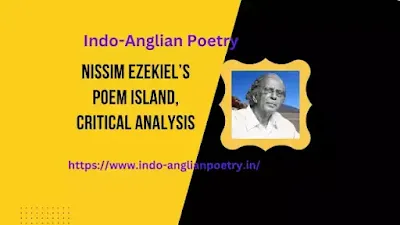Critical Analysis of the Poem:
“Island”, a beautiful lyric, appeared in Hymns in Darkness, which was published in 1976. It is written in five stanzas of five lines each. It deals with his favourite urban theme, the city of Bombay with all squalor and dirt, noise and violence, poverty and human misery.

It became a part of the poet's consciousness and he could not live without it. Besides “Island”, it forms the theme of “In India”, “Background Casually”, “At the Hotel”, “The Truth about the Floods” and many other poems. Linda Hess writes : “He is a poet of the city, Bombay; a poet of the body; and an endless explorer of the labyrinths of the mind, the devious delving and twisting of the ego, and the ceaseless attempt of man and poet to define himself and to find through all ‘the myth and maze’ a way of honesty and love”.
The poet deftly employs the device of paradox and contrast to describe the city of Bombay. The poem begins seriously enough. The image of the island is worked out at many levels; the city; the poetic self, and may be, the subcontinent itself.
In the opening stanza the city of Bombay is described through images as an island of “slums and skyscrapers”. The glaring contrast between the poverty and dirt, symbolised through “slums”, and the radiance of riches, symbolised through “skyscrapers” imparts a sense of reality to the poem. Bombay with its paradoxical growth and contrasts reflects the uneven and paradoxical growth of the poet's mind. He has completely identified himself with it. He has to find his way in it. How succinctly, symbolically and lucidly Ezekiel describes Bombay and his identification with it:
Unsuitable for song as well as sense
the island flowers into slums
and skyscrapers, reflecting
precisely the growth of my mind
I am here to find my way in it.
Despite his complete identification and assimilation with the city of Bombay, he feels utter loneliness and isolation. In the wilderness of isolation he cries for help but nobody helps him. So he remains silent and keeps his own counsel. The paradoxical character of Bombay has passed into the poet's consciousness, so he hears
…. distorted echoes.
of my own ambiguous voice
and of dragons claiming to be human.
The city has “bright and tempting breezes” which separate “past from future.” The air becomes calm and the poet sleeps “the sleep of ignorance.”
The city dweller, unable to escape to his “Lake Isle of Innisfree”, accepts the paradox:
How delight the soul with absolute
sense of salvation, how
hold to a single willed direction?
I cannot leave the island,
I was born here and belong
Even now a host of miracles
hurries me to daily business,
minding the ways of the island
as a good native should,
taking calm and clamour in my stride.
The poet has a strong feeling of belonging, of finding his identity in Bombay where he was born and brought up. He cannot do without Bombay. Ezekiel accepts the urban reality with a spirit of resignation and detachment toward “The kindred clamour close at hand. He no longer feels romantically melancholic about his alienation. He takes “calm and clamour” in his stride. He loves the city of Bombay, despite its ugliness and wickedness and the neurosis and maladjustment that it causes.
